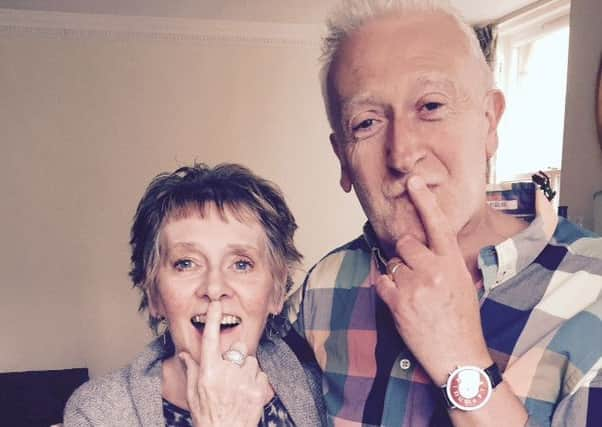Scottish MND sufferer Liz Ogg uses mobile app to communicate
This article contains affiliate links. We may earn a small commission on items purchased through this article, but that does not affect our editorial judgement.


Former English teacher, Liz Ogg - a self-confessed chatterbox - was devastated after she lost her voice due to MND.
She said free mobile phone voice apps have helped her communicate properly with friends and family for the first time in a year.
Advertisement
Hide AdAdvertisement
Hide AdLiz, who has two daughters and three granddaughters, first experienced problems with her speech three years ago and within a year she lost her ability to speak altogether.
The first sign that there was a problem was when Liz noticed she was having increasing problems with her speech. As the problem got worse, she underwent months of tests and was devastated finally to be told she had the rarer bulbar form of MND, which affects the power of speech first.
Liz’s now blogs to highlight the struggles she and her husband Alan have faced and what has helped them cope with the dramatic changes in their lives.
“We’ve had tremendous help and support from both NHS and MND Scotland staff, for which we are very grateful. But MND is such an individual disease that sometimes, we have had to find our own personal solutions.
“It sounds very simple, but for everyday management of things in the house, my husband and I have devised a small set of hand gestures. Starting with the simple thumbs up and thumbs down for yes and no. We’ve had to work at it, but we now have a range of signs for regular domestic routines, which work pretty well. It helps if you’re good at charades… sadly he’s not!”
In the first instalment of her ‘Ogg Blog’, Liz, who always loved to talk, describes how mobile phone voice apps have helped her chat with friends and family after losing her voice to the disease.
“I have notebooks and pens left at several points around the house and in my bag, to allow me to have my say. But what has really set me free is the use of my Android phone and iPad to speak through voice Apps.
“There are Apps which you can buy, but I’ve found the best for voice quality is ‘Type and Speak’, and it’s free to download. There’s a selection of voices to choose from, depending on where you come from, and they’re free to download too.
Advertisement
Hide AdAdvertisement
Hide Ad“I’ve become quicker at typing in what I want to say and joining in any conversation. My friends have got used to me waving my phone in the air to get their attention!”
Other blogs will cover a wide range of issues affecting people with the disease, such as dealing with difficulties when eating, drinking and sleeping, and the importance of staying positive.
“Despite the bad times, and there are some, my husband and I try to remain positive and make the very best of what we have. It’s not always easy, but it’s the only way,” she said.
Craig Stockton, CEO from MND Scotland, said: “We are so impressed with Liz’s positive attitude, which has made a huge difference to how she is coping with her illness.
“It is amazing how new technologies can be adapted to help people in her situation. Liz uses her own smart phone and tablet to help her communicate, however we feel everyone with MND should have access to assistive technology. We have been campaigning to ensure this is a statutory right. We are delighted that the First Minister announced, in September 2015, that the Scottish Government will introduce a mandatory right to communications equipment. This amendment to the Health Bill will be going through Parliament right now.
“MND Scotland also has an equipment loan service, with a variety of assistive technologies, for people who have MND to make use of. We have a wealth of experience in our charity and lots of other ideas and tips to help with MND, so if you would like to know more check out our website – www.mndscotland.org.uk.”
To read more of Liz’s blog please visit: www.lizmnd.blogspot.com.
